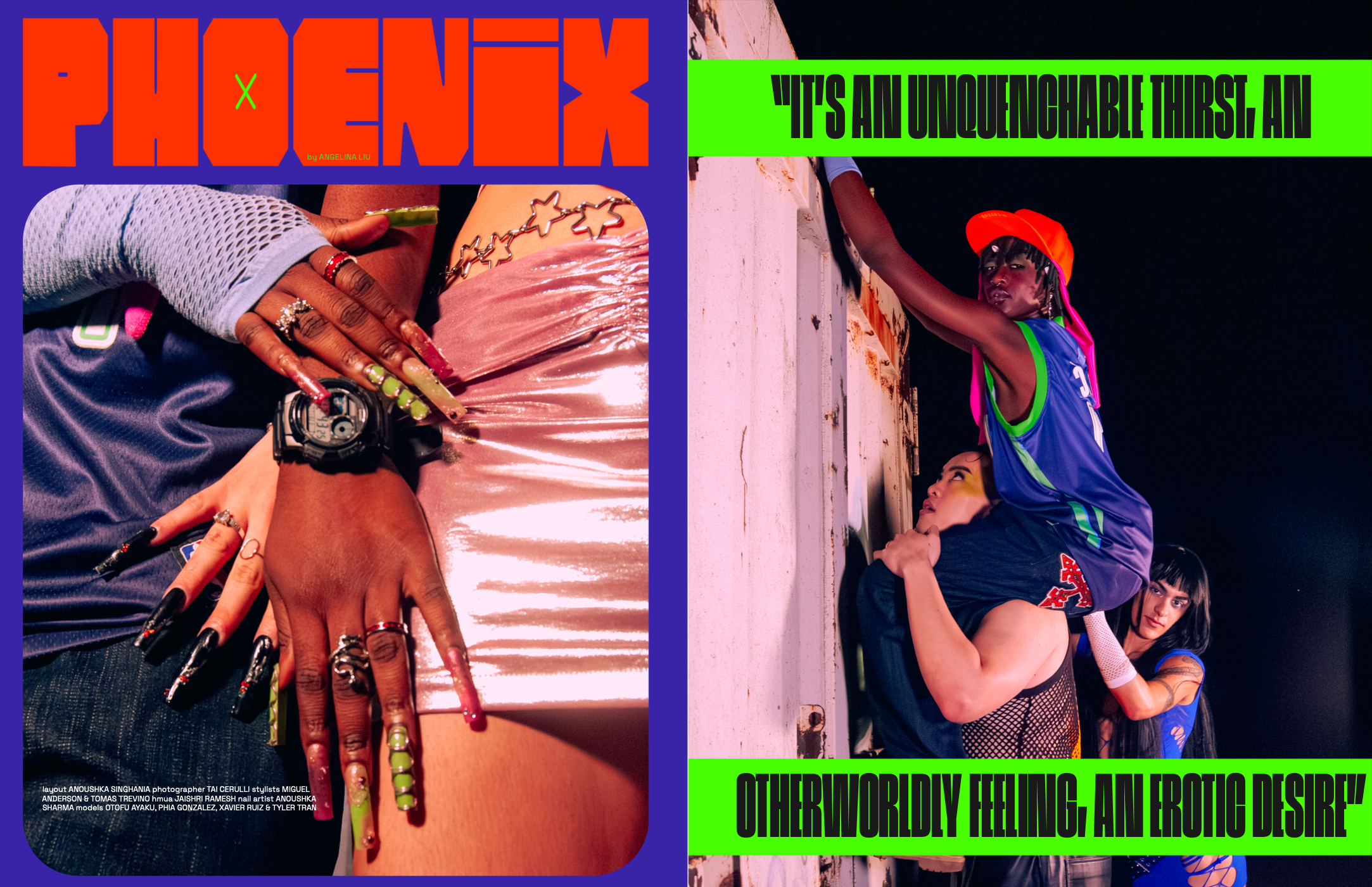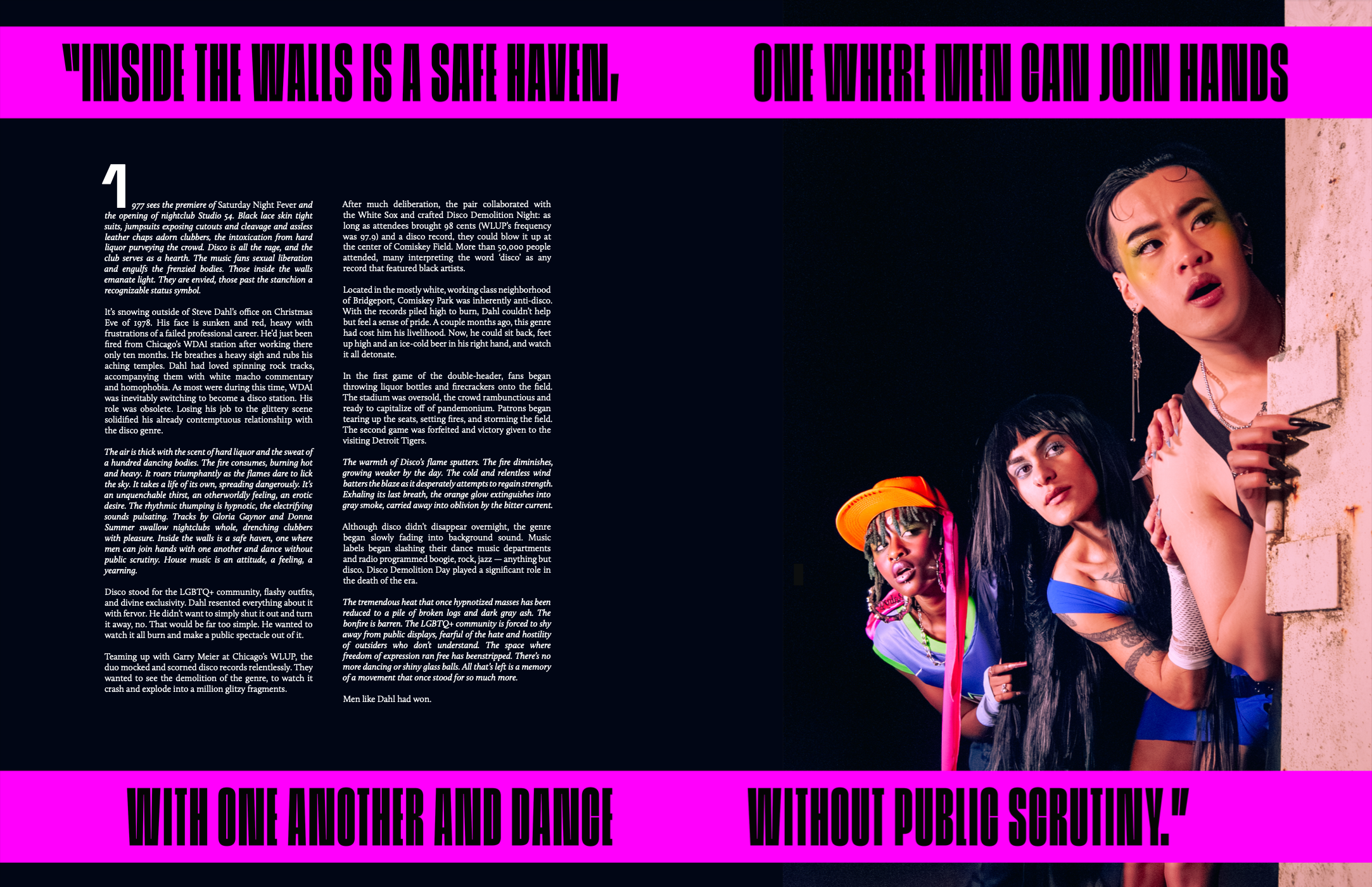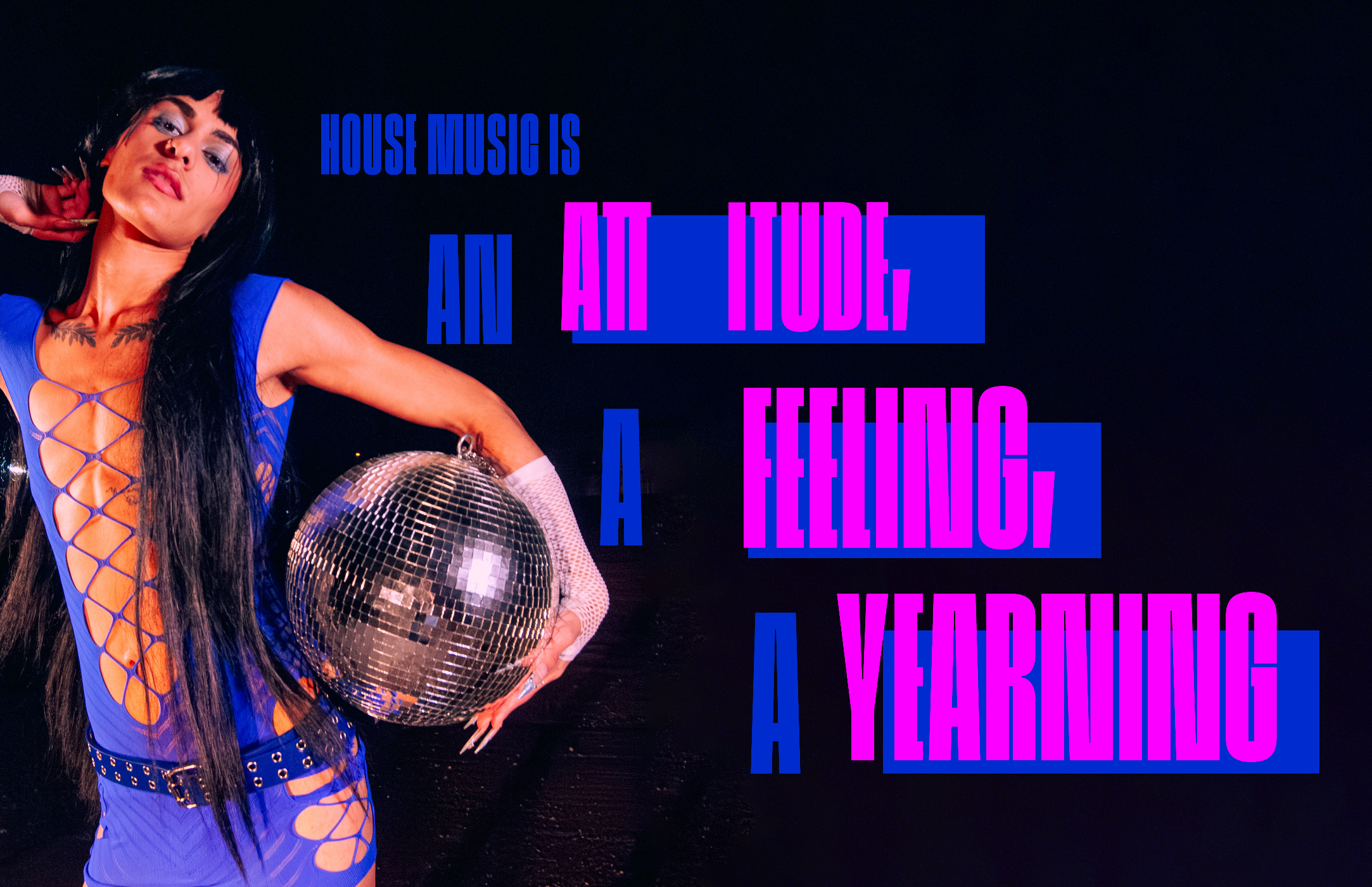PHOENIX
By Angelina Liu
April 27, 2024




It’s an unquenchable thirst, an otherworldly feeling, an erotic desire.
1977 sees the premiere of Saturday Night Fever and the opening of nightclub Studio 54. Black lace skin tight suits, jumpsuits exposing cutouts and cleavage and assless leather chaps adorn clubbers, the intoxication from hard liquor purveying the crowd. Disco is all the rage, and the club serves as a hearth. The music fans sexual liberation and engulfs the frenzied bodies. Those inside the walls emanate light. They are envied, those past the stanchion a recognizable status symbol.
It’s snowing outside of Steve Dahl’s office on Christmas Eve of 1978. His face is sunken and red, heavy with frustrations of a failed professional career. He'd just been fired from Chicago's WDAI station, after working there only ten months. He breathes a heavy sigh and rubs his aching temples. Dahl had loved spinning rock tracks, accompanying them with white macho commentary and homophobia. As most were during this time, WDAI was inevitably switching to become a disco station. His role was obsolete. Losing his job to the glittery scene solidified his already contemptuous relationship with the disco genre.
The air is thick with the scent of hard liquor and the sweat of a hundred dancing bodies. The fire consumes, burning hot and heavy. It roars triumphantly as the flames dare to lick the sky. It takes a life of its own, spreading dangerously. It’s an unquenchable thirst, an otherworldly feeling, an erotic desire. The rhythmic thumping is hypnotic, the electrifying sounds pulsating. Tracks by Gloria Gaynor and Donna Summer swallow nightclubs whole, drenching clubbers with pleasure. Inside the walls is a safe haven, one where men can join hands with one another and dance without public scrutiny. The mirrorball is an attitude, a feeling, a yearning.
Disco stood for the LGBTQ community, flashy outfits, and divine exclusivity. Dahl resented everything about it with fervor. He didn’t want to simply shut it out and turn it away, no. That would be far too simple. He wanted to watch it all burn and make a public spectacle out of it.
Teaming up with Garry Meier at Chicago’s WLUP, the duo mocked and scorned disco records relentlessly. They wanted to see the demolition of the genre, to watch it crash and explode into a million glitzy fragments.
After much deliberation, the pair collaborated with the White Sox and crafted Disco Demolition Night: as long as attendees brought 98 cents (WLUP’s frequency was 97.9) and a disco record, they could blow it up at the center of Comiskey Field. More than 50,000 people attended, many interpreting the word ‘disco’ as any record that featured black artists.
Located in the mostly white, working class neighborhood of Bridgeport, Comiskey Park was inherently anti-disco. With the records piled high to burn, Dahl couldn’t help but feel a sense of pride. A couple months ago, this genre had cost him his livelihood. Now, he could sit back, feet up high and an ice-cold beer in his right hand, and watch it all detonate.
In the first game of the double-header, fans began throwing liquor bottles and firecrackers onto the field. The stadium was oversold, the crowd rambunctious and ready to capitalize off of pandemonium. Patrons began tearing up the seats, setting fires, and storming the field. The second game was forfeited and victory given to the visiting Detroit Tigers.
The warmth of Disco’s flame sputters. The fire diminishes, growing weaker by the day. The cold and relentless wind batters the blaze as it desperately attempts to regain strength. Exhaling its last breath, the orange glow extinguishes into gray smoke, carried away into oblivion by the bitter current.
Although disco didn’t disappear overnight, the genre began slowly fading into background sound. Music labels began slashing their dance music departments and radio programmed boogie, rock, jazz — anything but disco. Disco Demolition Day played a significant role in the death of the era.
The tremendous heat that once hypnotized masses has been reduced to a pile of broken logs and dark gray ash. The bonfire is barren. The LGBTQ community is forced to shy away from public displays, fearful of the hate and hostility of outsiders who don’t understand. The space where freedom of expression ran free has beenstripped. There’s no more dancing or shiny glass balls. All that’s left is a memory of a movement that once stood for so much more.
Men like Dahl had won.
***
On 206 South Jefferson St. sits a nightclub named The Warehouse. Sitting at three stories high, the exterior of the former factory is expressionless and unassuming, a perfect facade for the crowds it hosted. During a time where being African American and gay was a precarious combination, the club emerged as a sanctuary where anyone could be anything.
After crossing the barrier, music immediately engulfs you. The sound ascends through the floor, up the flights of stairs and rushes for release at the top of the industrial roof. There’s a never-ceasing, pulsating rhythm that takes a life of its own, breathing a fire of four-on-the-floor beats. It’s something spiritual that only happens once a week, much like Sunday morning church. Societal and religious expectations no longer held a grasp on the primarily Black gay male crowd, for they had found their salvation.
Frankie Knuckles, the resident DJ, found a multitude of ways to keep the music fresh and his audience dancing. In an era without disco music, he experimented with re-edits of songs by adding new beats, extending intros and breaks and splicing different songs. Mixing a large variety of music with a reel-to-reel tape machine, he added percussion breaks and extended the breakdowns of energetic sections of songs. The pioneer created a melting pot of independent soul artists, underground European dance mixes and imported Italo disco.
Grabbing various records, Knuckles re-arranges them with his turntable, synthesizer and drum machine. From flame, he welds a sound that is wholly new. His music is an experience, something that cannot be mimicked or challenged by the playing of a pressed vinyl or cassette tape. He takes speeches from Martin Luther King and mixes them with deep cuts from the Philly soul catalog. When he tires of it all, he turns off all the lights and sets up a record that sounds like a speeding train about to crash into the club. He knows what turns the simmer into a boil. He is the architect, those within the walls at his mercy of his divine direction.
At first, the New York native faced skepticism from the Chicagoans. After all, the club was private and invite only. However, with time, Knuckle’s distinctive sound attracted thousands to flock to the Warehouse Friday through Sunday night. He kept his crowd dancing from dusk until dawn, playing marathon DJ sets that lasted more than eight hours.
Driving by, clubs advertise ‘house’ music on large vinyl banners, coined from the original hearth at The Warehouse. The sound is infectious and quickly catching. The ember has reignited, the inferno an unquenchable thirst.
What was started in a small Chicago club by the Black and LGBTQ community gave birth to an entirely new genre. Clubs in the area began copying the sound, and it reached New York City, Detroit, Philadelphia and Europe.
Men like Dahl had lost.
The phoenix rises from disco, possessing such power that its soundscapes can heal anything that it touches and the ashes can bring the dead to life. The creature reigns immortal, indestructible, and forever born again. ■
Layout: Anoushka Singhania
Photographer: Tai Cerulli
Stylists: Miguel Anderson & Tomas Trevino
HMUA: Jaishri Ramesh
Nail Artist: Anoushka Sharma
Models: Otofu Ayaku, Phia Gonzalez, Xavier Ruiz & Tyler Tran
Other Stories in RAW
© 2025 SPARK. All Rights Reserved.
